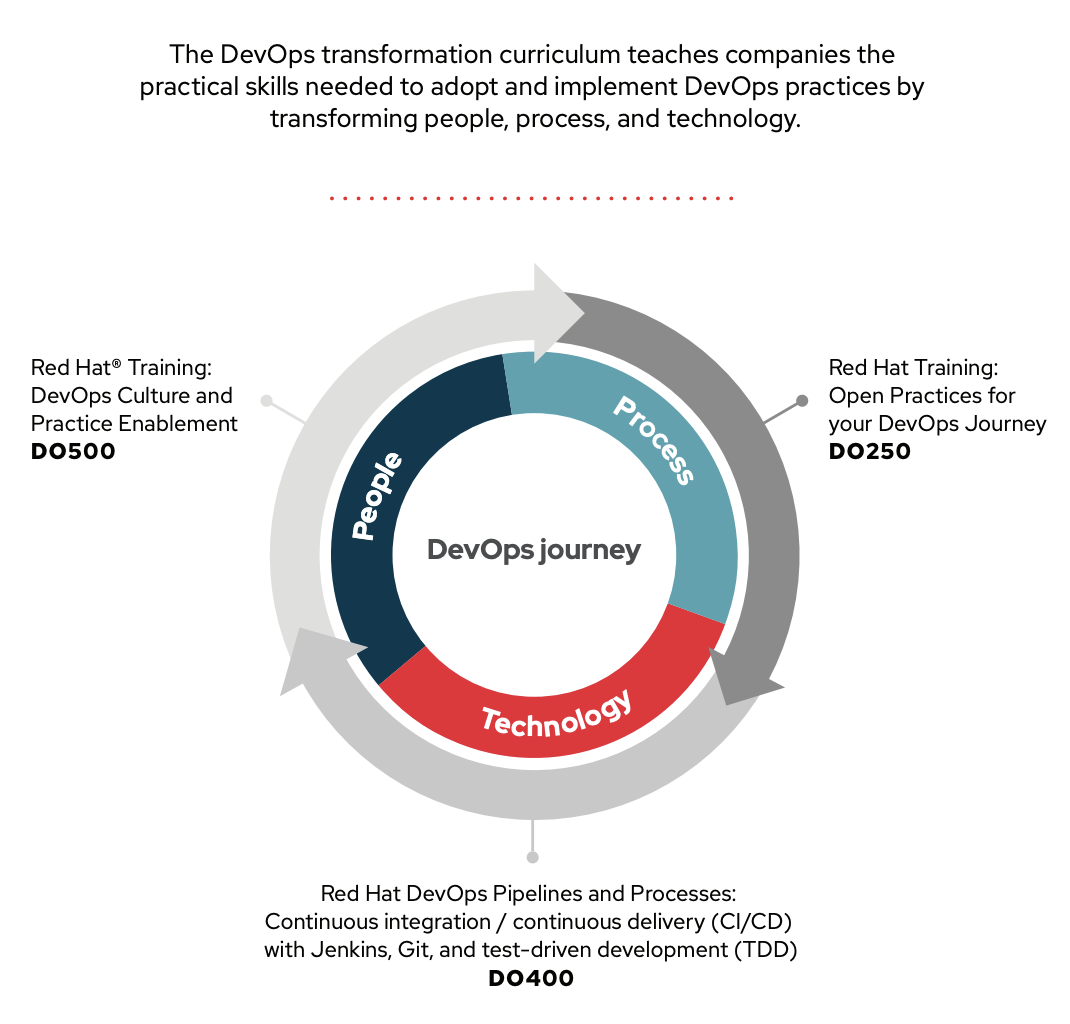Digital transformation is a non-starter for government agencies if they can’t close their digital skills gap.
The potential for transformation is real, according to a recent International Data Corporation (IDC) study.
But to take full advantage of that innovation, agencies need to invest in training that will help employees use that technology effectively.
Red Hat’s DevOps transformation curriculum teaches organizations the practical skills needed to adopt and implement DevOps practices by transforming people, process and technology. DevOps is a software development methodology that solves the problematic product handoff between developers and operations staff. Instead of operating in silos, both teams collaborate on a project from start to finish.
The successful shaping of an organization’s DevOps culture depends on a few key factors: leadership, technology, and investment in quality training resources.
With Red Hat’s immersive DevOps curriculum, these critical concepts can help catalyze widespread transformation within your organization.
Why DevOps training matters
Viewing development through the DevOps lens requires communication, teamwork, and shared ownership. This sort of culture shift can pose a challenge to small and large teams alike: How does an organization get buy-in and alignment from all of its staff?
One critical component of enabling transformational change is training. DevOps teams are 44% more productive, and IT infrastructure teams are 34% more efficient than those without training, according to the IDC study.
To truly enable a transformational change and adopt new technologies, the culture and processes of the organization must change and adapt to modern DevOps capabilities.
365% ROI in three years, deploy new IT resources 59% faster (IDC)
Learn DevOps tools and best practices
Red Hat courses show how tools like Git, Jenkins and Kubernetes can be used with Red Hat technology to make DevOps work for the entire organization. With these tools and practices, organizations can close skill gaps to help find success from early stages of development all the way through to production.

The curriculum is designed to teach the practical skills needed for a company to adopt and implement DevOps practices by transforming people, processes, and technology. Each course focuses on providing depth in specific areas:
- Open Practices for your DevOps Journey (DO250) focuses on process best practices that enable the Mobius loop of discovery, delivery and option pivots. This conceptual foundation provides a practical toolkit to facilitate better meetings and projects with a team to make incremental changes and plant the seed for future DevOps transformation.
- DevOps Culture and Practice Enablement (DO500) provides an immersive experience to give DevOps professionals the mindset for solving problems in a new way and set the bar for using DevOps practices in their teams. The course blends continuous discovery and continuous delivery together with cultural and technical practices into a unique, highly engaging experience, packed with real-world applications.
- Red Hat DevOps Pipelines and Processes: CI/CD with Jenkins, Git, and Test Driven Development (TDD) (DO400) covers the technology, tooling, and how to leverage them to develop and deploy cloud-native applications. In this course practitioners learn to simplify and more efficiently integrate code, build efficiently with TDD, and use automated pipelines to simplify testing.
This combination of optimized processes, modernized technologies, and an effective cultural change can help drive DevOps to take root in any organization. These courses can be taken in any order and combination based on the organization’s preferences and the responsibilities of the individual.
This blog post was an excerpt from Red Hat’s article, Accelerate your DevOps journey with a trio of training offerings from Red Hat.
To kick off your DevOps transformation journey, click here to learn more.
